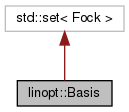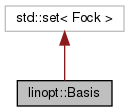The class representing a collection of Fock states. More...
#include <states.h>


Public Types | |
| using | Set = std::set< Fock > |
| Convenience typedef to std::set. | |
| using | Value = Fock |
| using | value_type = Value |
| using | Reference = Value & |
| using | reference = Reference |
| using | Iterator = Base::iterator |
| using | ConstIterator = Base::const_iterator |
| using | ReverseIterator = Base::reverse_iterator |
| using | ConstReverseIterator = Base::const_reverse_iterator |
Public Member Functions | |
| int | size () const |
| Returns the number of Fock states in the basis. | |
| Basis (const Set &s) | |
| Basis (std::initializer_list< Fock > il) | |
| Basis (int nphot, int modes) | |
Constructs a basis of all possible Fock states with modes modes and containing nphot photons. | |
| Basis | operator+ (const Basis &b) const |
Returns a basis which is a union of Fock states from both *this and b. | |
| Basis & | operator+= (const Basis &b) |
Effectively equivalent to *this = (*this) + b. | |
| Basis | operator* (const Basis &b) const |
| Calculates a tensor product of two bases. More... | |
| Basis & | operator*= (const Basis &b) |
Effectively equivalent to *this = (*this) * b. | |
| Basis & | generateBasis (const int nphot, const int modes, const Fock &head=Fock()) |
Generates a basis of all possible Fock states with modes modes and containing nphot photons. More... | |
| Basis | postselect (const Fock &ancilla) const |
| Returns a postselected basis after observing ancilla. More... | |
| template<typename ExecPolicy = execution::Seq> | |
| State | applyFunction (const FockAmpFunction &f) const |
Constructs a state from the basis using function f. More... | |
Detailed Description
The class representing a collection of Fock states.
The interface of this class is very similar to std::set<fock>.
Member Function Documentation
◆ applyFunction()
| State Basis::applyFunction | ( | const FockAmpFunction & | f | ) | const |
Constructs a state from the basis using function f.
- Parameters
-
[in] f – function to apply.
- Returns
- Constructed state.
Applies a function f to all Fock states of *this to compute a corresponding amplitude of a resulting state.
◆ generateBasis()
Generates a basis of all possible Fock states with modes modes and containing nphot photons.
- Parameters
-
[in] nphot – number of photons in each Fock state. [in] modes – number of modes in each Fock state.
- Parameters
-
[in] head – intended for internal usage. Normally empty Fock state should be passed.
- Note
- This funtion only appends elements to
*thisand never removes them. Therefore, if you want to freshly generate a basis, you should callbasis::clearfirst.
◆ operator*()
Calculates a tensor product of two bases.
Returns a basis consisting of all possible elementwise tensor products of elements of *this and b.
◆ postselect()
Returns a postselected basis after observing ancilla.
- Parameters
-
[in] ancilla – ancilla's Fock state for postselection.
- Returns
- A basis after postselection.
Postselection of a basis \( B \) with the ancilla state \( | \mathrm{anc} \rangle = | a_0, a_2, \dots, a_A \rangle \) picks only Fock states from \( B \) with the heading (first \( A \) occupation numbers) which equals to \( | \mathrm{anc} \rangle \). The headings do not get to the new constructed basis. Note that currently there is no possibility to specify a position of ancilla modes.
For example, postselection of a basis
\[ \{ | 0000001 \rangle, | 1234567 \rangle, | 1239999 \rangle \} \]
with the ancilla \( | 123 \rangle \) results in the basis
\[ \{ | 4567 \rangle, | 9999 \rangle \}. \]
The documentation for this class was generated from the following files:
- states.h
- states.cpp
 1.8.13
1.8.13